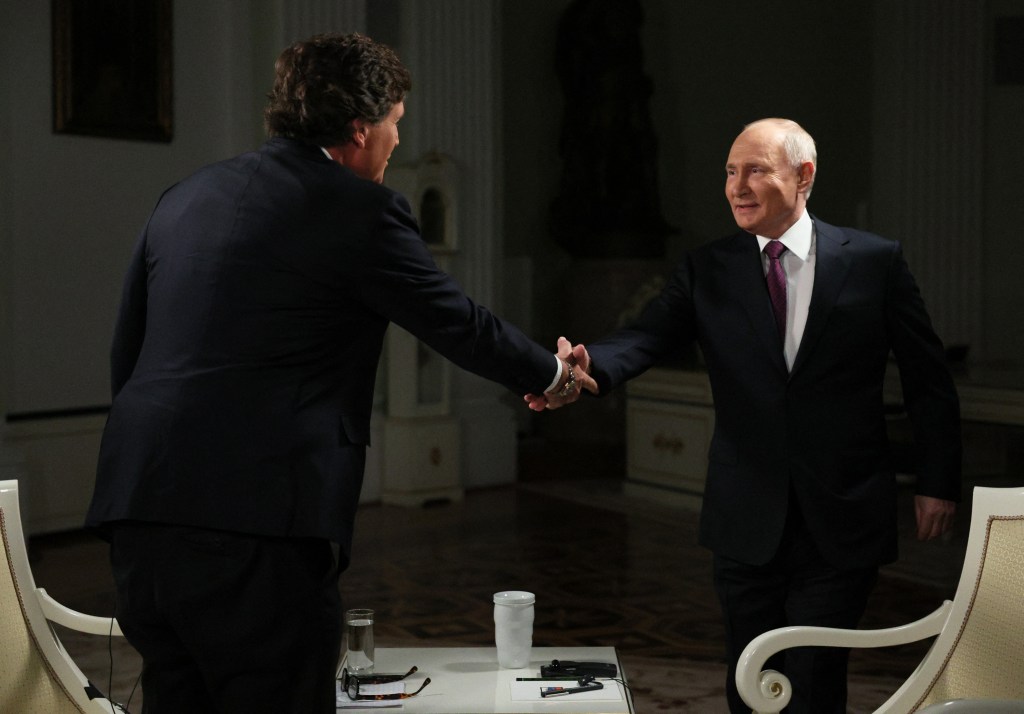My old National Review colleague Michael Brendan Dougherty is an horological enthusiast, as am I, which is nice in that it gives us something to talk about other than his wretched political opinions, which are getting worse by the day. E.g., he tweets: “All the Russian girls that work at the watch boutiques in NY also complain that NYC is unbelievably dirty and smelly compared to their home cities.”
Q: Why are those nice “Russian girls” selling Breguets and Vacherons in New York, I wonder?
One possible answer is found in a report that is a little old but the most recent we have:
Russia leads the developed world with the worst sanitation record, according to the London-based WaterAid NGO. A 2012 estimate citing official data placed the number of Russians whose households are only equipped with outhouses at 35 million, or roughly a quarter of the population. Of the 22.6 percent of households without a centralized sewage system, 16.8 percent use a system of pipes connected to pit toilets, RBC cited the State Statistics Service, Rosstat, as saying. The other 5.8 percent lack a sewage system altogether. In rural Russia, almost two-thirds have no access to indoor toilets, 48.1 percent of whom use outhouses and 18.4 percent do not have a sewage system.
So reported the Moscow Times in 2019. The Moscow Times, being a news organization, is of course now banned in Moscow and in the rest of Russia.
When that report was published, Russia was riding a gusher of oil-and-gas money. What happened to it? Where did it get spent? Not on the necessary things:
A terrible accident happened in the provincial Russian city of Bryansk when a mother, who was walking with her young child along public sidewalks, fell into a portion of the walkway that had collapsed due to the stress of an unmaintained sewer pipe in January 2012. The 1.5-year-old boy was swept away by the force of the water and died. The court found the director and the chief engineer of the Water Supply Authority guilty of negligence, allowing the pipes to go unrepaired and thus putting citizens in danger. It was somehow forgotten that one of the “culprits” behind the pipe failure had been ringing the alarm on the subject for years, asking the authorities to take immediate measures to repair the main sewage and water collectors (which had been built in the 1950s and 1960s) and advocating for modernisation, expansion and maintenance since 1987.
However, no repairs were carried out in the late Soviet times or during perestroika—and not even in the “golden early 2000s,” when Russia’s economy was abounding in oil gold. Since the aforementioned child died as a result of falling into the collector in 2012, a number of reports have surfaced saying that several other people in Bryansk have also fallen into the sewer system at different locations. Some of the victims literally sunk into the ground beneath their feet.
Which is to say, Russians are neck-deep—or deeper—in whatever it is Tucker Carlson is producing these days.
Carlson, who is doing a fantastic impersonation of Walter Duranty—the disgraced New York Times correspondent who treated American readers to tales of the glory of life in Joseph Stalin’s Russia—reports that the experience of seeing how clean and orderly Moscow is was “radicalizing” for him. I suppose that everything in the ordinary world looks a little dingy after La Jolla Country Day School and that Swiss boarding school that expelled him. And American cities can be pretty awful, it is true, a consequence of Americans’ general contempt for public spaces. Many American tourists have had the experience of being shocked and shamed by how spruce and lovely things are in Amsterdam, for example—but not as many have seen the housing projects and sprawl beyond the parts of the city tourists frequent. The difference is real, but it is easy to exaggerate, too: You could spend a fortnight in London without seeing the city’s unlovely side, but the same is true of Philadelphia and Dallas.
The irony of the Putinism and near-Putinism we see on the contemporary right—one of the ironies, anyway—is that Moscow represents precisely what they believe (wrongly, for the most part) Washington to be: an imperial city in which a coddled, politically connected, decadent urban elite enrich themselves through official influence and off-the-books relationships while scouring the countryside for young men to recruit into their vicious wars of imperialism and conquest. Of course the “Russian girls” MBD encounters in Manhattan boutiques do not have a lot to say about that: If they know, they may not be inclined to say, and if they are inclined to say, they are—or should be—terrified to do so. That’s what terror states do: They terrorize.
They are also pretty good at faking things. Duranty fell for it, because he wanted to fall for it. Progressive hero Lincoln Steffens, too, who famously observed of the Soviet Union: “I have seen the future, and it works.”
Does it?
An interesting metric: The poor Mexicans who are coming to the United States are fleeing a country that is, as the IMF runs the numbers, slightly wealthier than Vladimir Putin’s Russia, with a GDP/capita of $13,804 compared to Russia’s $13,006. And, indeed, if you visit the nice parts of Mexico City, you will be surprised how well they compare to much of New York City, Los Angeles, or Houston. You can have the same experience in lots of places, some of them surprising. Much of this is just rank Thomas Friedman-ism, mistaking the simple newness of recently developed infrastructure in Hong Kong or Dubai for evidence of a better and more effective social system. Newark Liberty is not much compared to the airport in Madrid, true—but it isn’t much compared to the airport in Salt Lake City, either. I don’t suppose there’s a doctoral thesis or a presidential campaign to be made out of the fact that new airports are, generally speaking, nicer than old ones, though some older airports are pretty nice, too: Palm Springs, Zurich, Schiphol, etc.
There’s a reason for that, too. Or reasons.
It isn’t just about money: Aspen’s little airport isn’t really very nice or well-run at all. Infrastructure is complicated. Cities are complicated. In the same way you can never have the same party twice, you never have the same traffic jam twice. There are a lot of reasons Stuttgart is so much nicer than Detroit—and I don’t think German automotive-industry protectionism is in the top 10. But if what you want is protectionism, then everything you see is a case for protectionism. If what you want is Putinism, then you see evidence for the virtues of Putinism. But don’t look too hard.
That grandiose metro station in Moscow has long been famous in the West. The Russian secret police arrested a number of the British engineers who built the Moscow metro—you didn’t think Russians built that, did you?—and held an espionage show trial for them. Lovely space, though, and, if you look, you can still find recordings of “Songs of the Joyous Metro Conquerors.” Hooray. New York’s subway system is a mess, and the $4 billion per mile price of the Second Avenue project is a scandal. Does anybody think the answer is a more Putinist approach? The question is almost too silly to ask.
I understand not liking the United States—I really, really do understand: As I have written before, I still love my native country, but I think we should start seeing other people. Ours is an often ugly, often vulgar, spiritually sick society. But turning instead for inspiration to a brutal police state in which 1 out of 5 families do their necessary business in a hole in the ground is—counterintuitive! Finding inspiration in the gulag where Wall Street Journal reporter Evan Gershkovich currently is held as a political prisoner—a real political prisoner, not the victims of the “patriot purge” of Tucker Carlson’s daffy imagination—is also counterintuitive. But, then, what Carlson was up to in Moscow wasn’t journalism—journalism is what Evan Gershkovich did, and what Tucker did was, at best, tourism. It is tempting to call him a useful idiot, but he isn’t an idiot. He knows what he is doing. I myself don’t speak Russian, but I think I could read the look on Putin’s face, which said: “Good doggie.”
Carlson no doubt saw the best that Moscow has to offer. But the average Russian is worse off than the average Mexican, Bulgarian, or Panamanian. I am reminded of our Viktor Orbán-admiring friends who see only the finest bits of Budapest, never mind that Orbán and his ilk talk about Budapest the way his American counterparts talk about San Francisco. I don’t think those Americans swanning around the restaurants and nightclubs of the capital would very much enjoy life in the parts of the country that the Orbánists celebrate. But, then, I don’t think they’d like using a latrine pit out there in the real Russia, either.
At what point do we just admit that these guys admire Vladimir Putin’s gulag state for reasons other than its public hygiene? Because it sure looks to me that Tucker Carlson and Michael Brendan Dougherty and a lot of Republicans have something in common with Walter Duranty’s clip file and the underplumbed Russian countryside: They’re all full of s—.







Please note that we at The Dispatch hold ourselves, our work, and our commenters to a higher standard than other places on the internet. We welcome comments that foster genuine debate or discussion—including comments critical of us or our work—but responses that include ad hominem attacks on fellow Dispatch members or are intended to stoke fear and anger may be moderated.
With your membership, you only have the ability to comment on The Morning Dispatch articles. Consider upgrading to join the conversation everywhere.